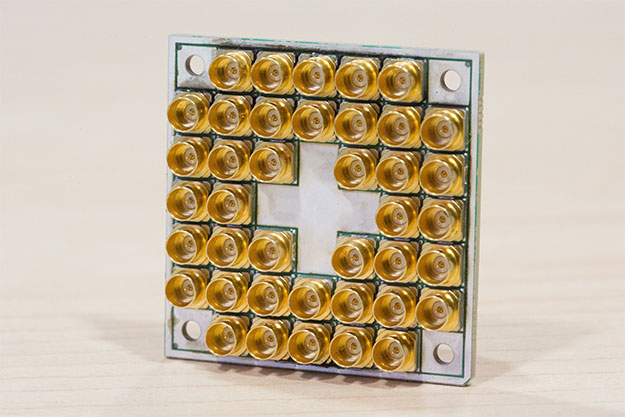Intel Unleashes 17-Qubit Superconducting Test Chip For Quantum Computing

Coffee Lake is not the only thing Intel has been brewing up. The world's largest semiconductor company announced the delivery of a 17-qubit superconducting test processor for quantum computing to QuTech, its quantum research partner based in the Netherlands. Intel fabricated the chip with a unique design to improve yield and performance, the Santa Clara chip maker said.
By no means is the world of quantum computing new terrain for Intel, which has been working with QuTech for the past couple of years on research and development aimed at producing a working quantum computing system. Such a thing would be a major leap in parallel computing, as it would enable scientists and researchers to tackle some of the most complex problems that are still beyond the reach of conventional computers, such as simulating nature to gain a better understanding of chemistry, molecular models, and other fields that would make your brain spin.
"Our quantum research has progressed to the point where our partner QuTech is simulating quantum algorithm workloads, and Intel is fabricating new qubit test chips on a regular basis in our leading-edge manufacturing facilities," said Dr. Michael Mayberry, corporate vice president and managing director of Intel Labs. "ntel’s expertise in fabrication, control electronics and architecture sets us apart and will serve us well as we venture into new computing paradigms, from neuromorphic to quantum computing."
Intel's chip is around the size of a quarter, in a package that is closer in size to a half-dollar coin. It features a new architecture that makes it more reliable than previous test chips, while also giving it improved thermal performance and less radio frequency (RF) interference between qubits. And compared to wirebonded processors, a scalable interconnect scheme allows for 10 to 100 times more signals into and out of the chip.
"With this test chip, we’ll focus on connecting, controlling and measuring multiple, entangled qubits towards an error correction scheme and a logical qubit," said professor Leo DiCarlo of QuTech. "This work will allow us to uncover new insights in quantum computing that will shape the next stage of development."
The buck does not stop with a superconducting chip, or even the hardware system as a whole. Intel and QuTech are interested in tackling the entire quantum computing stack, from the chips and devices, to the software and ecosystem. For right now, however, producing working hardware is the big challenge. This is due in part to the fragility of qubits, which requires them to operate at around 20 millikelvin—that's about 250 times colder than deep space. Brrr!

